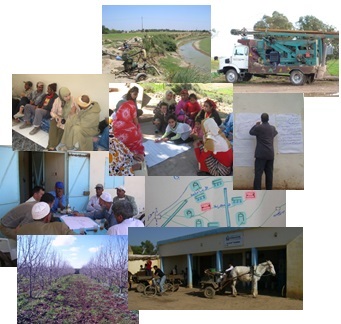Zhour Bouzidi, Nicolas Faysse
DOI : https://doi.org/10.60569/hsoua-a1
Hors série ouvrières agricoles, juillet 2024
Résumé
La féminisation du salariat agricole au Maroc est de plus en plus visible : les ouvrières agricoles ont pris un rôle essentiel au cœur des systèmes de production agricole et des chaines alimentaires. Cependant, leurs conditions de travail sont souvent très précaires. Certaines de ces ouvrières agricoles sont aussi des mères célibataires et vivent des conditions encore plus difficiles. Nous analysons les trajectoires de ces femmes à la fois mères célibataires et ouvrières agricoles, le rapport qu’elles ont à leurs enfants non reconnus socialement, et la manière dont ces femmes cherchent dans cette condition d’ouvrière agricole des possibilités d’autonomisation, d’affiliation sociale et de distanciation d’un milieu d’origine stigmatisant. L’étude est menée sur la base d’une analyse des expériences d’une vingtaine de ces mères célibataires et ouvrières agricoles dans les régions du Saïss et du Gharb. Ces personnes se heurtent à une double invisibilité. La première est une invisibilité locale dans le cadre d’un mode de travail temporaire et anonyme, que les ouvrières recherchent pour se soustraire à la réprobation sociale de leur statut de mamans célibataires et pour reconstruire leur vie. La seconde est une invisibilité au niveau des politiques publiques de par leur transgression des normes sociales et juridiques. De ce fait, la condition de ces ouvrières mères célibataires est quasi absente des débats publics et n’est pas prise en compte par les politiques publiques. Leur condition est prise en compte par le secteur associatif ou d’autres initiatives d’appui, mais de façon encore timide. Cette situation ne permet pas de faire évoluer le regard négatif que porte la société sur cette catégorie sociale vulnérable.
Mots clés : invisibilité, Maroc , maternité célibataire, ouvrières agricoles stigmatisation
واقع الأمهات العازبات العاملات في القطاع الزراعي: نضال مزدوج على هامش الهامش
ملخص
شهد القطاع الزراعي تأنيثا متزايدا وملحوظا لليد العاملة. إذ تشكل العاملات الزراعيات دعامة أساسية ومركزية في نظم الإنتاج الزراعي والسلاسل الغذائية في حين تطبع الهشاشة ظروف عملهن. بعض هؤلاء العاملات الزراعيات هن أيضًا أمهات عازبات مما يجعل ظروف عيشهن أكثر صعوبة. يدرس هذا المقال مسارات هؤلاء النساء اللاتي هن أمهات عازبات وعاملات زراعيات في الوقت نفسه، وعلاقتهن بأطفالهن غير المعترف بهم اجتماعيًا، وكيفية سعي هؤلاء النساء في ظل هذه الظروف كعاملات زراعيات إلى البحث عن فرص للتمكين والانتماء الاجتماعي والابتعاد عن بيئة الأصل الموصومة. تُجرى الدراسة على أساس تحليل تجارب حوالي عشرين من هؤلاء الأمهات العازبات والعاملات الزراعيات في منطقتي سايس والغرب. تواجه هؤلاء الأشخاص ازدواجية في التهميش. الأول هو التهميش المحلي في إطار نظام عمل مؤقت ومجهول، حيث تبحث العاملات عن هذا الوضع للهرب من الإدانة الاجتماعية لوضعهن كأمهات عازبات وإعادة بناء حياتهن. الثاني هو التهميش على مستوى السياسات العامة بسبب انتهاكهن للمعايير الاجتماعية والقانونية. وبالتالي، فإن وضع هؤلاء الأمهات العازبات العاملات الزراعيات يكاد يكون غائبًا عن النقاشات العامة ولا يُؤخذ في الاعتبار من قبل السياسات العامة. يتم التعامل مع وضعهن من قبل القطاع الجمعوي أو مبادرات دعم أخرى، ولكن بشكل محدود. هذه الحالة لا تسمح بتغيير النظرة السلبية التي تحملها المجتمع تجاه هذه الفئة الاجتماعية الضعيفة.
الكلمات المفتاحية : العاملات الزراعيات، الأمومة العازبة، التهميش، الوصم، المغرب.
Being a farm worker and a single mother in Morocco: a dual struggle on the margins
Abstract
The feminisation of the agricultural workforce in Morocco is increasingly visible: women farm workers have taken on an essential role at the heart of agricultural production systems and food chains. However, their working conditions are often very precarious. Some of these women farm workers are also single mothers, and live in even more difficult conditions. We analyse the trajectories of these women who are both single mothers and agricultural workers, the relationship they have with their socially unrecognised children, and the way in which these women use their status as agricultural workers to seek opportunities for empowerment, social affiliation and distancing from a stigmatising background. The study is based on an analysis of the experiences of around twenty of these single mothers and farm workers in the Saïss and Gharb regions. These people face a double invisibility. The first is local invisibility in the context of a temporary and anonymous form of work, which the women workers seek in order to escape the social stigma of their status as single mothers and to rebuild their lives. The second is their invisibility to public policy because of their transgression of social and legal norms. As a result, the condition of these single working mothers is virtually absent from public debate and is not taken into account by public policy. The voluntary sector and other initiatives try to support them, but do it only to a limited extent. This situation does nothing to change the negative way in which society views this vulnerable social category.
Keywords: invisibility, Morocco , single motherhood, female farm workers stigmatisation

